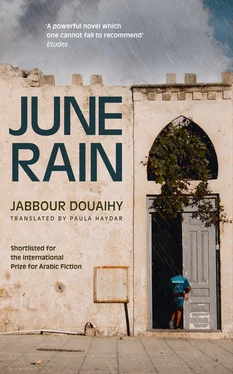I was looking for something to shade myself from the sun, which was burning a hole in my head, when we heard some noise coming from the back of the line, and some shouting, ‘The committee! The committee!’
We were pleased by the arrival of the committee, because it broke the monotony of our long wait. It was a small procession of three cars led by a police motorcycle escort. The first to get out of the car was a short man with thick black glasses and a black splotch on the upper part of his face. Two other men accompanied him. An officer rushed to greet him calling him ‘Henry Beyk’. We recognised him; the Ghandour recognised him. It seemed he was the one who’d raised the money from some wealthy friends of his in Beirut. We also found out what happened was the United States had been sending aid to Lebanon in the form of surplus wheat, and there was a businessman who suggested that the government sell the wheat from America — at discounted prices of course — and use the money to pay compensation to the victims’ families and to broker a reconciliation between us. The businessman had been slow in delivering the money and the reconciliation was delayed up until the day when we lined up in front of the Michel Hlayel barracks in Qubbah.
As Henry Beyk was walking, he stumbled, nearly falling over, which prompted the fat lady standing in front of me to shout, ‘Oh God!’ One of his bodyguards rushed to catch his fall. Henry Beyk smiled and looked around as if he wanted to thank the woman for her concern. Her concern was artificial, just like her. Some people around us said he was the owner of the racetrack in Beirut; a man standing in front of the fat lady said he used to be the foreign minister at the time of the Lebanese independence. He stopped to let the people who’d come with him from Beirut catch up with him.
An officer in dress uniform got out of the second car. The three soldiers who were in charge of making sure we didn’t cut in line saluted him. Soldiers always salute officers even if they don’t know them, at the mere sight of stars on their shoulders. He was very stern and I felt he was looking at us with disdain. The whole time I was standing in the queue inside that barracks I had the feeling that the military men were looking at the civilians with contempt. By civilians, I mean us. We reciprocated, calling them government horses, all fattened up with nothing to do. We wouldn’t reach out to help them because we believed they held ulterior motives — to attack us. None of us would ever join the army except as an officer.
The third man had a large folder tucked under his armpit; it was brimming with papers he kept reorganising to prevent them from spilling out. He wore thick glasses and smiled right and left for no reason as if smiling was his constant expression. People said he was the committee’s lawyer. I didn’t understand at the time why the committee needed to appoint a lawyer.
So here was the committee. Maybe they’d come to make sure the money was distributed properly. Word went around in whispers that the family zaeems would be arriving soon. The three members of the committee entered the main barracks building. The lawyer took a look at the long line as he went up the stairs leading to the door. Perhaps he thought there were more people in line than were entitled to receive compensation according to what was recorded in those papers of his that threatened to strew themselves on the ground.
A little later some journalists arrived; they must have heard about the committee’s arrival. As they proceeded to the military building where the committee had entered, they went around taking pictures of us. They too were fascinated by the long line. When one of the photographers aimed his camera in the direction of the area I was standing in, I turned instinctively and once again tried to hide behind the fat lady. But the flash went off quickly, right in my face. The next day I saw another picture of me in the newspaper, on the front page. The newspaper seller with the limp was very happy. He took a big stack of papers and circulated through all the town’s neighbourhoods. He even went down narrow alleys he’d never gone down before, crying, as was his custom to try to sell papers, ‘News about the people of Barqa, today! Read all about it!’
In the picture, I appeared to be smiling, even though I hadn’t been in the best mood standing there in the long line with the fat lady in front of me, her hand over her mouth as she let out a long ululation. I hadn’t even noticed that the photographer had aimed his camera at us again to take that picture because I was preoccupied, like everyone else, with the arrival of the Rami family zaeem .
He got out of his car quickly, possibly worried he was late for the meeting with the committee. Two of his bodyguards rushed up ahead of him as well. Some people in the front of the line clapped somewhat cautiously, maybe to avoid angering the soldiers in charge of supervising them. But all of a sudden the fat lady let out a loud ululation, which made me realise she was one of them. I might have guessed that, since I didn’t know her. If she were one of us I would have seen her in the neighbourhood at least once. She let out a never-ending ululation, like the ones they do at weddings, and another woman tried to imitate her but didn’t fare so well in the length department, her voice cracking quickly.
The Ghandour also appeared in the picture in the newspaper, leaning on my shoulder. They had been trying to get a picture of the woman who was ululating for her family zaeem and the Ghandour and I ended up in the picture, too. I think he might have been cursing the Rami family the very moment the picture was taken. I remember when the fat lady had started to ululate he said horrible things, starting with an attack on her dead relatives and all her ancestors before turning on her mother and sister and even her daughter, calling them a bunch of whores who’d inherited the profession from their elders.
My brother didn’t appear in the photo and neither did my uncle’s wife. The journalists wrote things in the paper about us that we in the Lower Quarter didn’t like. They said, ‘From the early hours of morning…’ I didn’t like that expression ‘From the early hours of morning’, as if to imply we were eager to get our money. And also, how would they know we’d been there since early in the morning? The reporters didn’t come until after the committee arrived. And the paper also described how the families of the victims who died in the events of 1957 and 1958 crowded into the North Lebanon military intelligence office. It went on to say, ‘These citizens, a crowd of simple folk, were preparing to enter the office of the committee to receive compensation for the bloodshed…’ Who told whoever wrote the article we were ‘simple folk’?
Ghaleb al-Semaani sat outside his cousin’s store on a low wicker stool reading the article out loud. He liked to hear his own voice as he read to the usual crowd of listeners. That happened whenever the newspaper seller passed by and the shopkeeper would open up his register and buy a newspaper from him that lasted all day long, getting passed along from one pair of hands to another. When Ghaleb reached the part about ‘this crowd of simple folk’, he stopped reading and pointed with his middle finger at the article, indicating exactly where on the page that expression appeared. ‘Simple folk?’ he retorted. ‘We’re simple folk, you son of a you know what?’
We in the Lower Quarter didn’t like being insulted. The next time the newspaper vendor came around he was going to get an earful of harsh words.
After the Rami family zaeem arrived, all the other cards starting falling into place. All of the town’s dignitaries began descending upon the barracks one by one. They would walk past us, look us over, greet some of us here and there, and then enter the barracks building. The head of the municipality came, too. Our family headman passed through. His right eye was red and swollen, perhaps remnants of a sty. He waved to us. A woman at the end of the line ululated for him; no other woman imitated her. It seemed like she was doing it to antagonise the fat lady standing in front of me. They applauded for him, too. We were on our way into the small building to receive cheques and they were on their way into the big building to hold a meeting. We were headed to the military intelligence office, they to the office of the military commander of the north district. The newspaper published two pictures: one of the fat lady ululating with me smiling behind her and the Ghandour whispering curses into my ear, and the other of them holding their meeting — the zaeems and the committee seated in a circle around a desk behind which a high-ranking officer wearing black glasses was seated. They were smiling, and one of them, the Rami family zaeem , was sipping a cup of coffee.
Читать дальше












